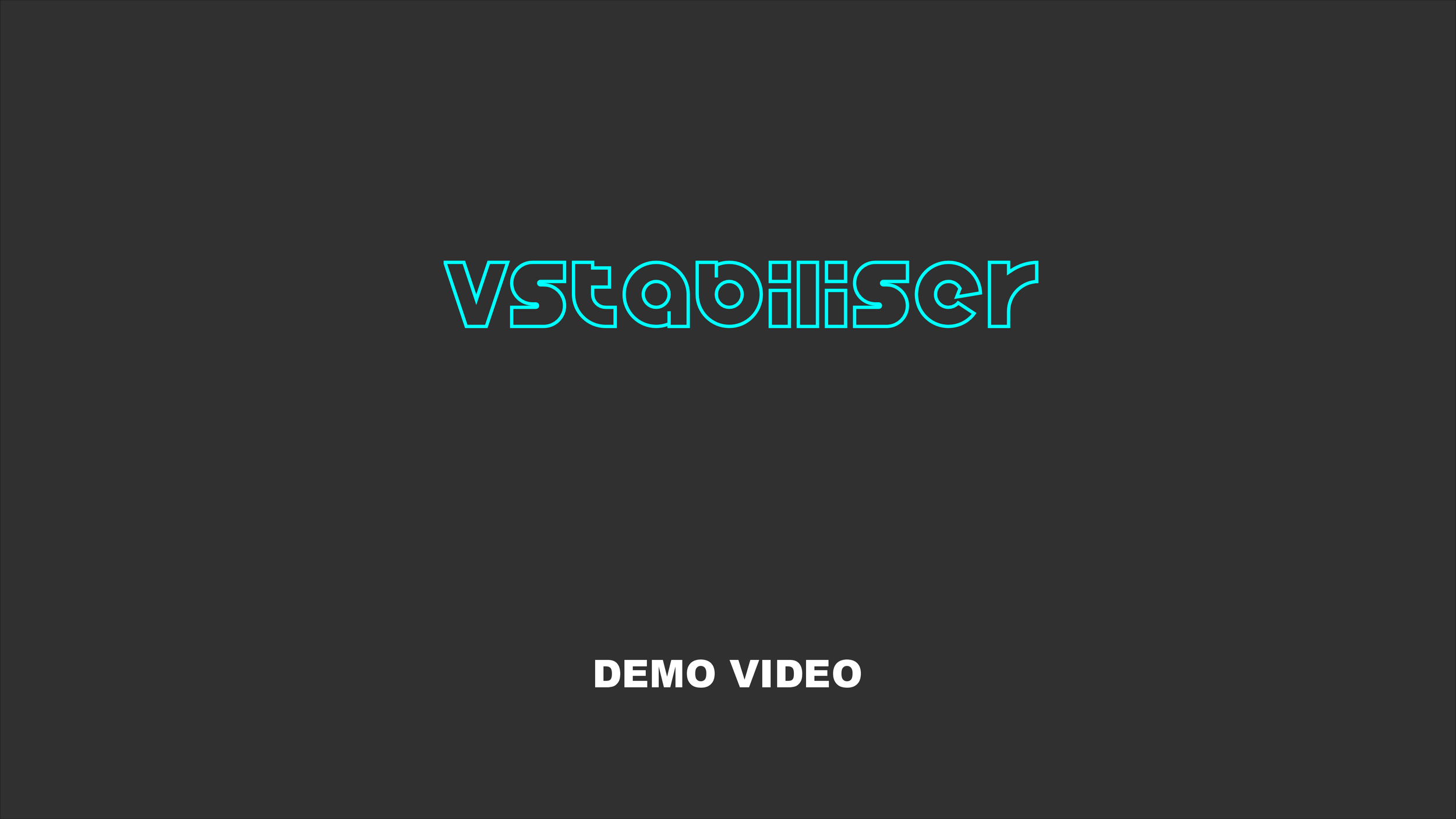VStabilizerCv C++ lib. Fast cross-platform video stabilisation library
C++ library VStabilizerCv v4.0.3 is designed for 2D and 3D digital video stabilization (horizontal offset, vertical offset and rotation).
LICENSE: We sell source code of this library as is, without future updates and technical support according to perpetual non-exclusive royalty-free license. You pay once and can use this library in your software and hardware products without limits. Please read the license agreement before purchasing: DOWNLOAD LICENSE.You can buy technical support service for this product.
C++ library VStabilizerCv v4.0.3 is designed for 2D and 3D digital video stabilization (horizontal offset, vertical offset and rotation).
LICENSE: We sell source code of this library as is, without future updates and technical support according to perpetual non-exclusive royalty-free license. You pay once and can use this library in your software and hardware products without limits. Please read the license agreement before purchasing: DOWNLOAD LICENSE.You can buy technical support service for this product.
C++ library VStabilizerCv v4.0.3 is designed for 2D and 3D digital video stabilization (horizontal offset, vertical offset and rotation).
LICENSE: We sell source code of this library as is, without future updates and technical support according to perpetual non-exclusive royalty-free license. You pay once and can use this library in your software and hardware products without limits. Please read the license agreement before purchasing: DOWNLOAD LICENSE.You can buy technical support service for this product.
Purchase options
You can by this software online by bank transfer. Bank transfer available only for companies. To buy software by bank transfer please send us request to info@constantrobotics.com. Also, you can buy technical support service for this product.
Overview
C++ library VStabilizerCv is designed for 2D and 3D digital video stabilization (horizontal offset, vertical offset and rotation). The library is used in camera systems for video vibration compensation. The library is written in C++ (C++17 standard) and uses the OpenCV library (version 4.5 and higher) to perform various operations (cv::dft, cd::idft, cv::warpAffine etc.). The library has a simple programming interface and a minimal number of parameters. The library inherits interface from VStabiliser class which provides flexible, customizable parameters and can be easily integrated into systems of any complexity. Additionally the demo application depends on open source SimpleFileDialog library (provide file dialog functions to open video files). The library supports varies pixel formats (RBG24, BGR24, GRAY, YUV24, YUYV, UYVY, NV12, NV21, YV12, YU12, listed in Frame class) and performs calculations in a single computational thread. The library is supplied as source code only.
Demo video
Benchmarks
In order to evaluate the calculation speed of the VStabilizerCv library on a particular processor and operating system, the VStabilizerCvBenchmark test program is provided. It allows you to test the library with different parameters. The VStabilizerCvDemo application is provided as well for testing on your video. Additionally, a test video file is provided to ensure uniform testing conditions across different platforms. The test video provides the most challenging conditions for the stabilisation algorithms. For scenarios with lower vibrations, the processing time can be even lower. Detailed information about benchmark results can be found in Programmer’s manual. Some results (processing time for one video frame, best results):
Intel(TM) i7-13700H, 1920x1080 pixels video, 2D stabilisation - 1.2 msec.
Intel(TM) i7-13700H, 1920x1080 pixels video, 3D stabilisation - 3.5 msec.
Intel(TM) i7-13700H, 1280x720 pixels video, 2D stabilisation - 1.0 msec.
Intel(TM) i7-13700H, 1280x720 pixels video, 3D stabilisation - 1.4 msec.
Raspberry PI 4B, 1920x1080 pixels video, 2D stabilisation - 9.0 msec.
Raspberry PI 4B, 1920x1080 pixels video, 3D stabilisation - 28.0 msec.
Raspberry PI 4B, 1280x720 pixels video, 2D stabilisation - 6.0 msec.
Raspberry PI 4B, 1280x720 pixels video, 3D stabilisation - 16.0 msec.
Jetson Orin NX, 1920x1080 pixels video, 2D stabilisation - 3.9 msec.
Jetson Orin NX, 1920x1080 pixels video, 3D stabilisation - 13.6 msec.
Jetson Orin NX, 1280x720 pixels video, 2D stabilisation - 3.0 msec.
Jetson Orin NX, 1280x720 pixels video, 3D stabilisation - 6.2 msec.
Test video and stabilisation results with different library parameters you can check on video.
Simple interface
class VStabiliserOpenCv: public VStabiliser
{
public:
/// Class constructor.
VStabiliserOpenCv();
/// Class destructor.
~VStabiliserOpenCv();
/// Get string of current VStabiliserOpenCv class version.
static std::string getVersion();
/// Init all video stabiliser parameters by params structure.
bool initVStabiliser(cr::vstab::VStabiliserParams& params) override;
/// Set value to parameter with given id.
bool setParam(cr::vstab::VStabiliserParam id, float value) override;
/// Get parameter with given id.
float getParam(cr::vstab::VStabiliserParam id) override;
/// Get params.
void getParams(VStabiliserParams& params) override;
/// Execute command.
bool executeCommand(cr::vstab::VStabiliserCommand id) override;
/// Stabilise video frame.
bool stabilise(cr::video::Frame& src, cr::video::Frame& dst) override;
/// Get offsets: horizontal, vertical and rotation.
void getOffsets(float& dX, float& dY, float& dA) override;
/// Decode and execute command.
bool decodeAndExecuteCommand(uint8_t* data, int size) override;
};
Simple example
#include <iostream>
#include <opencv2/opencv.hpp>
#include <VStabiliserOpenCv.h>
// Entry point.
int main(void)
{
// Init video source.
cv::VideoCapture cap;
if (!cap.open("test.mp4"))
return -1;
// Get video frame size.
int width = (int)cap.get(cv::CAP_PROP_FRAME_WIDTH);
int height = (int)cap.get(cv::CAP_PROP_FRAME_HEIGHT);
// Init images.
cv::Mat opencvSrcFrame(cv::Size(width, height), CV_8UC3);
cv::Mat opencvDstFrame(cv::Size(width, height), CV_8UC3);
cr::video::Frame srcFrame(width, height, cr::video::Fourcc::BGR24);
cr::video::Frame dstFrame(width, height, cr::video::Fourcc::BGR24);
// Create video stabilizer object.
cr::vstab::VStabiliserOpenCv videoStabilizer;
// Set video stabilizer parameters.
videoStabilizer.setParam(cr::vstab::VStabiliserParam::SCALE_FACTOR, 1);
videoStabilizer.setParam(cr::vstab::VStabiliserParam::TYPE, 0);
// Main loop.
while (true)
{
// Capture next video frame.
cap >> opencvSrcFrame;
if (opencvSrcFrame.empty())
{
// If we have video we can set initial video position.
cap.set(cv::CAP_PROP_POS_FRAMES, 1);
// Reset video stabiliser.
videoStabilizer.executeCommand(cr::vstab::VStabiliserCommand::RESET);
continue;
}
// Copy video frame data from OpenCV image to Frame object.
memcpy(srcFrame.data, opencvSrcFrame.data, srcFrame.size);
// Stabilise frame.
if (!videoStabilizer.stabilise(srcFrame, dstFrame))
std::cout << "Stabilisation not calculated" << std::endl;
// Copy Frame object data to OpenCV image.
memcpy(opencvDstFrame.data, dstFrame.data, dstFrame.size);
// Show source and result images.
cv::imshow("SOURCE VIDEO", opencvSrcFrame);
cv::imshow("RESULT VIDEO", opencvDstFrame);
// Process keyboard events.
switch (cv::waitKey(1))
{
case 27: // ESC - exit.
exit(0);
case 32: // SPACE - reset video stabilizer.
videoStabilizer.executeCommand(cr::vstab::VStabiliserCommand::RESET);
break;
}
}
return 1;
}





